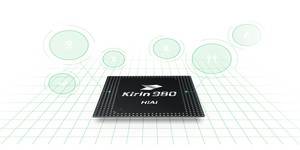
Mobile specialist Huawei has announced that it is going all-in on artificial intelligence, unveiling its first smartphone chipset to include a built-in neural processing unit (NPU): the Kirin 970.
Unveiled at the IFA 2017 event, Huawei's Kirin 970 is a major departure for the company: Rather than concentrating purely on common mobile technologies like general-purpose processing, graphical processing, and baseband processing, the chipset includes dedicated hardware for accelerating deep neural network (DNN) processing - something Huawei calls a neural processing unit (NPU).
'As we look to the future of smartphones, we're at the threshold of an exciting new era,' claimed Richard Yu, Huawei Consumer Business Group chief executive, at the event. 'Mobile AI [Artificial Intelligence] = On-Device AI + Cloud AI. Huawei is committed to developing smart devices into intelligent devices by building end-to-end capabilities that support coordinated development of chips, devices, and the cloud. The ultimate goal is to provide a significantly better user experience. The Kirin 970 is the first in a series of new advances that will bring powerful AI features to our devices and take them beyond the competition.'
The Kirin 970 includes an eight-core ARM-based CPU and a 12-core GPU, but it's the NPU that Huawei is keen to highlight: According to the company's internal testing, the NPU is capable of accelerating floating point compute performance as it relates to deep neural network (DNN) workloads by 25 times with a 50 times improvement in efficiency when stacked up against a quad-core ARM Cortex-A73 CPU.
Huawei isn't the only company working on DNN acceleration in low power envelopes, however. Movidius' Myriad and Myriad 2 visual processing units (VPUs) have previously appeared in mobile devices including thermal cameras and Google's Project Tango smartphone and tablet prototypes, with Intel launching a Myriad 2-based USB DNN accelerator even as it unveils the Myriad X with a tenfold improvement in performance over its predecessor. The Kirin 970, however, marks the first smartphone system-on-chip (SoC) to include DNN acceleration on the same die, rather than as a separate accelerator chip.
Huawei has not yet announced a product built around the Kirin 970, which is built on a 10nm process node.

MSI MPG Velox 100R Chassis Review
October 14 2021 | 15:04








Want to comment? Please log in.